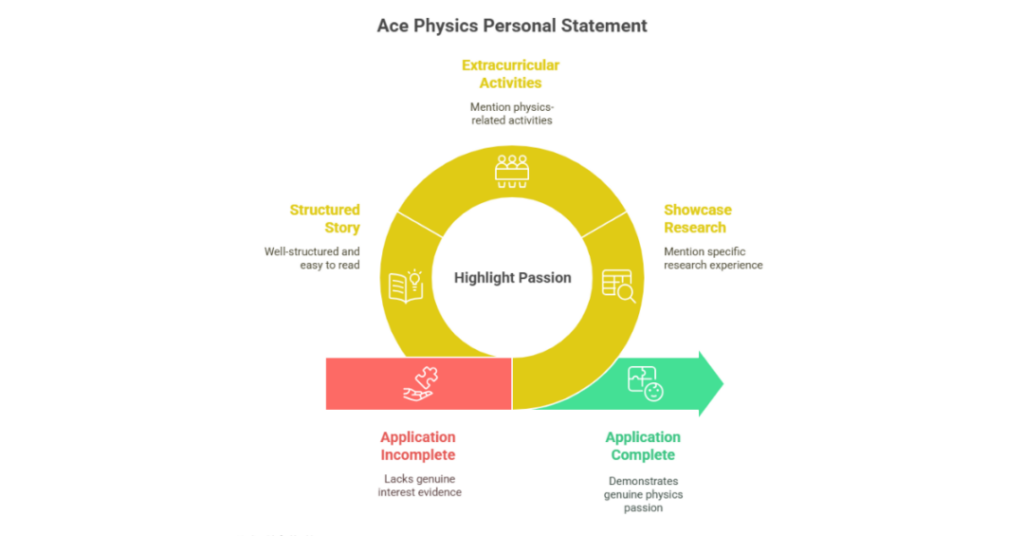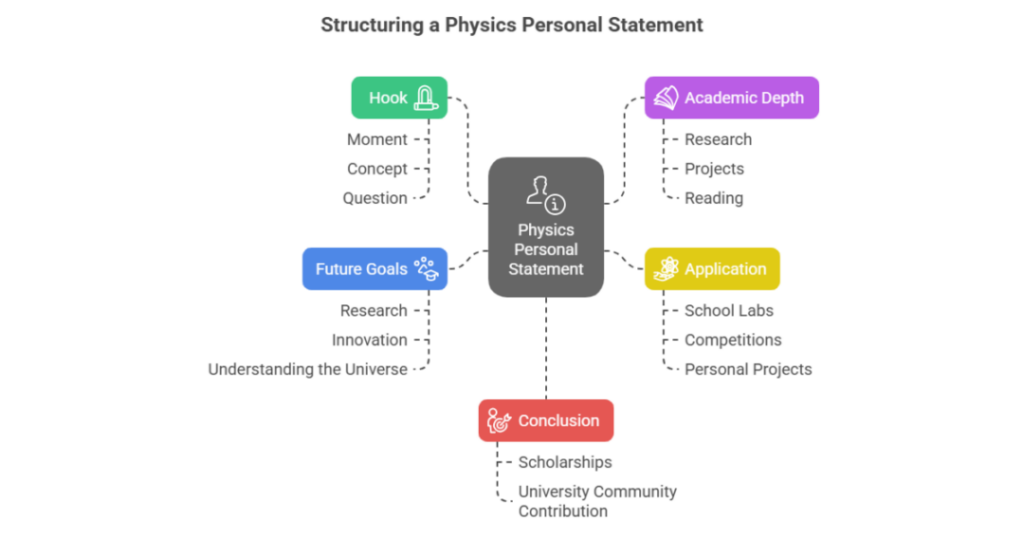27 May 2025
6 minutes read
How to Write the Best Physics Personal Statement for Indian students?

Key Takeaways
- A physics personal statement is often the deciding factor for Indian students aiming at top global universities like Oxford or MIT.
- Show real fascination, academic depth, and applied experience instead of listing random achievements or using clichés.
- Platforms like Ambitio help Indian students build standout applications with expert profile-building and storytelling support.
More than 65% of Indian students who apply to top physics programs, like the University of Oxford or Cambridge University, are rejected not because they have poor grades, but because they have poorly written physics personal statements. Most personal statements are full of general phrases, fake Einstein quotes, or a list of unconnected achievements!
Let’s be honest, admissions tutors do not want to read another “Newton inspired me” story; they want to read a well-structured, easy-to-read narrative that clearly shows your real interest in physics, evidence from your actual life, and learning or work experience.
Why Indian Students Must Take Their Physics Personal Statement Seriously?
For Indian students, a physics personal statement is not just a formality, it’s the core of your UCAS application. With fierce competition in fields like theoretical physics, particle physics, and astrophysics, tutors are looking for evidence of your genuine interest, not just grades.

Whether it’s quantum mechanics, string theory, or your mentor’s lecture on relativity, your story must be well-structured, easy to read, and rooted in real physics research and extracurricular activities that show you’re ready to study physics seriously.
5 Questions to Ask Yourself Before Writing a Physics Personal Statement
Before you begin writing your physics personal statement for university applications, take a moment to reflect. For Indian students applying to top global universities like MIT, Stanford University, or Cambridge, a generic Statement of Purpose (SOP) won’t cut it.
Admissions committees want to see more than grades, they want proof of your fascination with the field of physics, your mathematical mindset, and your readiness to contribute meaningfully to their programme. Ask yourself these 5 questions to shape a powerful, authentic story that goes beyond simple statements.
1. What first sparked your fascination with the study of physics?
Was it a Newton’s law demo at school, a popular science book, or your curiosity about the big bang and the workings of the universe? Pinpointing this shows genuine motivation, something every physics professor and department of physics values.
2. How have you explored physics beyond the classroom?
Think of scientific research, mentorship, or reading outside of GCSE, A-level, or your board curriculum. Mentioning extracurricular activities, lectures, or solving complex equations gives your physics application depth.
3. How do math and physics connect in your thinking?
The best applicants understand that mathematics and physics are inseparable. Whether it’s solving a quantum mechanics problem or understanding astronomy concepts, show how your love for math supports your learning.
4. What aspect of physics do you want to pursue at university?
Be specific, particle physics, string theory, or the field of physics that excites you most. This helps tutors see if your interests align with what the programme and university can offer.
5. Can you clearly explain why you want to be a future physicist?
Use your personal statement to give a clear, structured explanation of your academic goals, career plans, and how a degree in physics fits into that. Include intent to study at places like California Institute of Technology or University of California, Berkeley, if relevant, along with plans for IELTS, TOEFL, GMAT, or GRE.
How Indian Students Can Structure a Strong Physics Personal Statement for Undergraduate Admission?
Writing a compelling physics personal statement is one of the most crucial steps for Indian students applying to undergraduate programs abroad. Whether you’re aiming to study physics at the best university in the UK or the US, your statement must do more than list achievements.

It should explain what fascinates you, how you plan to understand nature, and what makes you a standout candidate. Here’s how to structure your statement effectively, one paragraph at a time.
1. Start with a hook that reflects your fascination with physics
Mention a moment, concept, or question that sparked your interest, maybe a thought-provoking class with a mentor, a quote by Albert Einstein, or a real-world event that made you see the importance of physics.
2. Show academic depth and curiosity
Explain how you’ve explored studying physics at university-level topics independently, through research, projects, or reading beyond the syllabus. Reflect on how you began connecting the pieces of the puzzle, from theory to application.
3. Demonstrate how you apply physics in and beyond the classroom
Use examples from school labs, competitions, or personal projects, even non-physics experiences where you applied logic or scientific thinking. This gives admissions officers a well-rounded context.
4. Connect your learning to your future goals
Clearly express why you want to study physics at university and what excites you about the academic journey ahead. Link it to real aspirations, whether research, innovation, or a deeper understanding of how the universe works.
5. Conclude with clarity and ambition
Wrap up with a confident outlook, referencing your intent to seek scholarships for international students or to contribute to your chosen university community. Make sure your closing lines reinforce the purpose of your physics personal statement.
Physics Personal Statement Examples
For Indian students, this is especially important as global universities seek applicants who not only excel in physics but also bring a unique perspective and clear purpose.
Below is a physics personal statement example, followed by insights on how to personalize it with practical personal statement advice.
Sample Physics Personal Statement
Ever since I encountered Newton’s explanation of gravity in a school textbook, I’ve been captivated by the simplicity and elegance with which physics explains the workings of the universe. This fascination has evolved into a deep commitment to understanding the laws that govern reality, from the orbits of planets to the mysteries of quantum mechanics.
My academic path reflects this passion. I consistently ranked in the top 5% in physics and mathematics during my A-levels, and I participated in the Indian National Physics Olympiad, where I advanced to the second round. But more than scores, what excites me is the thrill of discovery. Whether building basic particle detectors in my school lab or reading popular science books like Stephen Hawking’s A Brief History of Time, I constantly seek to challenge and expand my understanding.
During a summer internship at the Tata Institute of Fundamental Research, I worked under the guidance of a mentor in the department of theoretical physics. We explored symmetry in quantum field theory, and although I initially struggled, it taught me resilience and the importance of asking the right questions. That experience solidified my desire to study physics at university.
I also engage in non-physics pursuits, like classical music and debate, which sharpen my focus and communication skills. These experiences make me a more rounded individual, one who can collaborate, question, and contribute meaningfully to any academic community.
My goal is to pursue a degree in physics, contribute to scientific research, and eventually mentor others the way I was mentored. I am especially drawn to your program’s focus on independent research, interdisciplinary learning, and support for scholarships for international students, making it an ideal environment for my growth as a future physicist.
Insights & Personalization Tips
- Hook with honesty: Start with a real moment of curiosity, not a cliché. Avoid overused Einstein quotes unless they’re deeply personal.
- Focus on experience: As seen in the example, experiences like internships and competitions help Indian students stand out globally.
- Balance academics with personality: Include non-physics interests that show you’re well-rounded.
- Get personal statement advice early: A second pair of eyes, mentor, teacher, or expert, can help ensure your narrative is coherent, authentic, and goal-driven.
Conclusion
A well-written physics personal statement can be the difference between getting shortlisted or overlooked, especially for Indian students applying to top global programs. Your statement isn’t just about what you’ve studied, but how you think, explore, and want to contribute as a future physicist.
If you’re unsure where to begin or want expert feedback, Ambitio has your back. Our study abroad consultants specialize in profile building that turns good stories into unforgettable ones.
Want your application to stand out at MIT, Oxford, or Cambridge? Join Ambitio Elite today, where your passion for physics meets precision in storytelling. Let’s build your future, together.
FAQs
What is a physics personal statement?
A physics personal statement is a written piece for university applications where you showcase your passion, skills, and suitability for studying physics.
How long should my physics personal statement be?
Your physics personal statement must not exceed 4,000 characters or 47 lines on the UCAS form.
What should I include in my physics personal statement?
Focus on your enthusiasm for physics, academic achievements, relevant experiences, and specific interests in the subject.
Should I mention extracurricular activities not related to physics?
Only include extracurriculars if they demonstrate transferable skills relevant to physics; unrelated achievements should be avoided.
How can I make my physics personal statement stand out?
Make it unique by discussing specific aspects of physics that fascinate you and highlighting independent research or advanced topics you’ve explored.
Can I tailor my physics personal statement for a specific university?
No, as UCAS sends the same physics personal statement to all your choices, avoid naming specific universities or courses.
What are common mistakes in a physics personal statement?
Common mistakes include using clichés, irrelevant achievements, excessive jargon, negativity, or plagiarism, keep it focused and authentic.

You can study at top universities worldwide!
Get expert tips and tricks to get into top universities with a free expert session.
Book Your Free 30-Minute Session Now! Book a call now




























